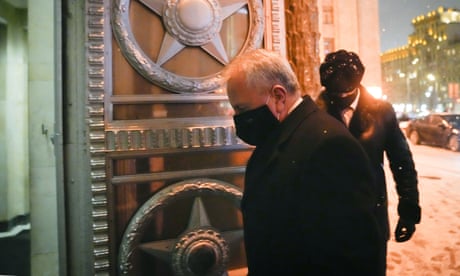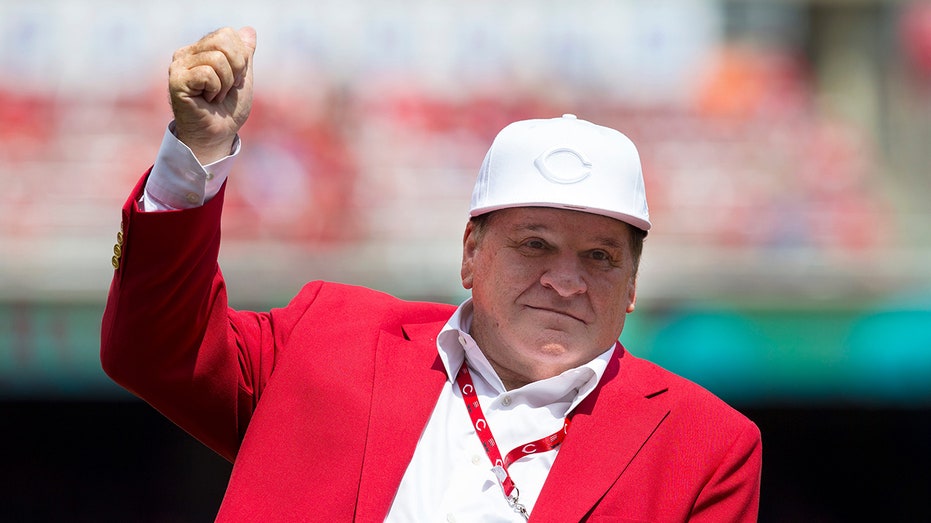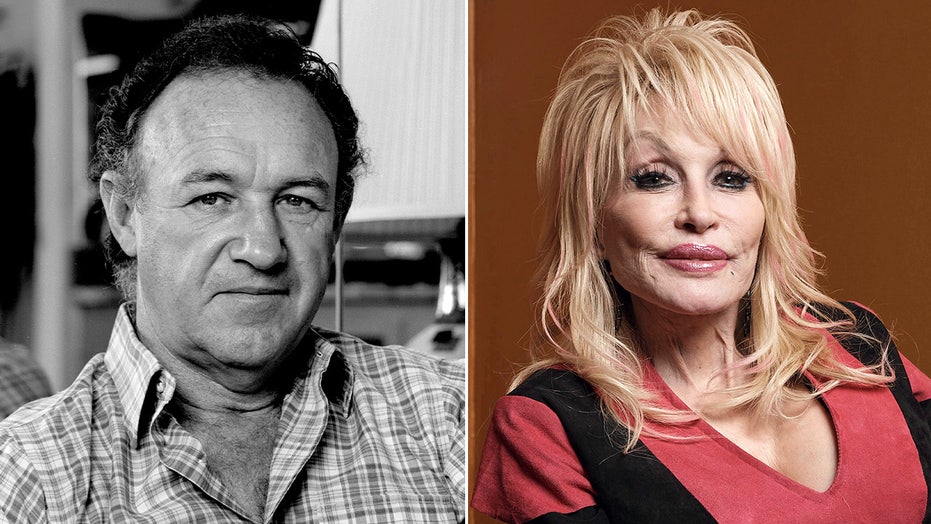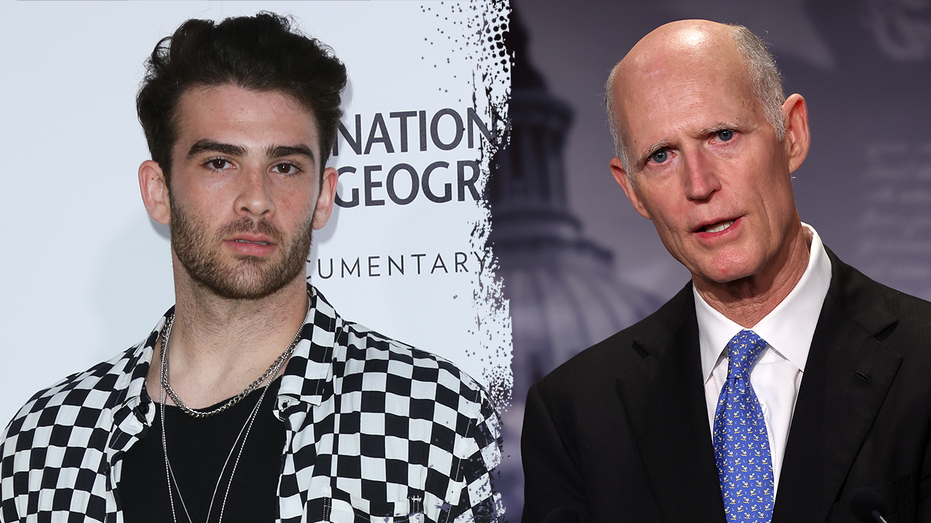- by foxnews
- 05 Mar 2025
US holds firm on Ukraine’s right to join Nato in its response to Russian demands
US holds firm on Ukraine’s right to join Nato in its response to Russian demands
- by theguardian
- 27 Jan 2022
- in news

The US has presented its written response to Russian demands on Ukraine, but made clear that it did not change Washington's support for Ukraine's right to pursue Nato membership, the most contentious issue in relations with Moscow.
The reply, which was delivered to the Russian foreign ministry by the US ambassador in Moscow, John Sullivan, repeats the US offer to negotiate with Russia over some aspects of European security, but the secretary of state, Antony Blinken, said the issue of eventual Ukrainian membership of the alliance was one of principle.
Blinken was speaking hours after his Russian counterpart, Sergei Lavrov, threatened "retaliatory measures" if the US response did not satisfy the Kremlin.
"Without going to the specifics of the document, I can tell you that it reiterates what we said publicly for many weeks, and in a sense for many, many years. That we will uphold the principle of Nato's open door," Blinken said, adding: "There is no change. There will be no change."
He said the US document would not be made public because "we think diplomacy has the best chance to succeed if we provide space for confidential talks".
Nato delivered its own response to Moscow on Wednesday with the same message on Ukrainian membership.
"Nato is a defensive alliance and we do not seek confrontation, but we will not compromise on the values on which our alliance rests," the secretary general, Jens Stoltenberg, told reporters, warning that "we face a critical moment in Euro-Atlantic security".
Stoltenberg said it was up to the 30 member states making up the North Atlantic Council to decide on when and whether to activate the Nato Response Force (NRF), a contingency plan to reinforce the alliance's eastern flank in the event of aggressive Russian moves. If the NRF is activated, up to 8,500 US troops now on heightened alert would be deployed to Europe, in a move aimed at reassuring allies that the US will come to their defence if they are threatened. Biden has made clear none of the US troops would be sent into Ukraine.
The Biden administration delivered its message to Moscow as Ukrainian and Russian representatives were meeting in Paris, together with French and German officials, in the latest diplomatic effort to slow the momentum towards a new war in Europe. The talks brought together the Kremlin's top official on Ukraine, Dmitry Kozak, and Andriy Yermak, the chief of staff to Ukraine's president, Volodymyr Zelenskiy.
At the end of the meeting, the four countries issued a joint statement supporting "unconditional observance of the ceasefire" and agreed to meet again in two weeks' time in Berlin.
Kozak told reporters that many issues in eastern Ukraine remained unresolved, but added that he hoped positions could be narrowed.
A French official said that, after the eight-and-a-half-hour meeting, "we have had good signs, in difficult conditions, that allow us to move forward" and to find a path of de-escalation. The official said it was encouraging that a joint declaration was agreed, for the first since December 2019.
The talks in Paris involved "a long conversation with highs and lows, moments of tension and moments that were more constructive", the official said, adding that Russia had come to the meeting in a spirit of negotiation.
Moscow wants assurances that Ukraine and Georgia will never be allowed to join Nato and has called for a pullout of Nato forces from eastern Europe, including Romania and Bulgaria, and a return to 1997 levels of deployment.
Blinken repeated the US and Nato position that they would not recognise any limitation on the right of Ukraine to pursue membership of the alliance.
"These are decisions for Nato nations as an alliance, not the United States unilaterally, but from our perspective, I can't be more clear: Nato's door is open, and remains open," he said.
The secretary of state said the US written response laid out areas in which the US was ready to negotiate, which have been raised in earlier talks. They include measures to improve mutual transparency over military operations, limiting military exercises and missile deployments in Europe and a new arms control treaty that would further limit the nuclear arsenals of the two countries.
Briefing the Duma, Russia's parliament, earlier in the day, Lavrov said that he and other top officials would brief Vladimir Putin on the next steps after receiving the US document.
"If the west continues its aggressive course, Moscow will take the necessary retaliatory measures," Lavrov warned. "We won't allow our proposals to be drowned in endless discussions."
US officials believe Moscow could use Washington's formal reply as a pretext to step up final military preparations. The US deputy security of state, Wendy Sherman, repeated a US warning that a Russian assault could start in the next few weeks but said Putin might wait until after his attendance at the Winter Olympics in China.
"I have no idea whether he's made the ultimate decision but we certainly see every indication that he is going to use military force some time [between] now and middle of February," Sherman said in an online discussion with the former Estonian president Kersti Kaljulaid.
"We all are aware that the Beijing Olympics are beginning on 4 February, the opening ceremony, and President Putin expects to be there. I think that probably President Xi Jinping would not be ecstatic if Putin chose that moment to invade Ukraine. So that may affect his timing and his thinking."
The White House has placed 8,500 troops on heightened alert to deploy to Nato countries in eastern Europe if necessary, and has stepped up arms supplies to Ukraine, alongside the UK and Baltic nations.
On Tuesday Biden said he would consider personal sanctions against Putin if Russia further invaded Ukraine, as well as "enormous consequences" that would damage the Russian economy.
Ben Wallace, the UK defence secretary, said he wanted Germany to go further on potential sanctions against Russia, as he travelled to Berlin for a bilateral this afternoon with Christine Lambrecht.
Since the autumn Russia has assembled a potential invasion force of more than 100,000 troops on the Ukraine border. It held military drills on Wednesday and moved soldiers and fighter jets to Belarus before exercises next month, within striking distance of Kyiv.
Interfax news agency quoted the Russian defence ministry as saying it had deployed a paratrooper unit to Belarus as well as Su-35 fighter jets as part of the Allied Resolve exercises.
Separately, Russian artillery forces in their country's southern Rostov region, which borders Ukraine, were to practise firing later on Wednesday as part of a combat readiness inspection of the southern military district, the defence ministry said.
In the far north, Russian warships entered the Barents Sea to practise protecting a major shipping lane in the Arctic, the Northern Fleet said. Moscow announced sweeping naval exercises last week.
Talks earlier this month between Russia and the US, Nato and OSCE ended without significant agreement. Moscow has threatened "military-technical" measures if the west fails to make concessions.
Ukrainian leaders have called for calm, with the defence minister, Oleksii Reznikov, telling parliament on Tuesday that an invasion was not imminent. He said the Russians had yet to form a combat battle group of the sort it would need, and "as of today, there are no grounds to believe" Russia would invade imminently.
"Don't worry, sleep well," he said. "No need to have your bags packed."
Additional reporting by Dan Sabbagh
- by foxnews
- descember 09, 2016
Popular travel destination breaks annual tourism record, sets new goal of 60M visitors
After breaking an annual tourism record in 2024, Japan looks to reach 60 million visitors by 2030. Officials tell Fox News Digital how Japan plans to attract visitors.
read more


